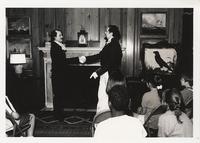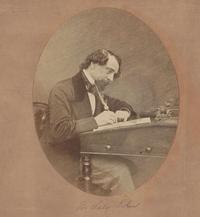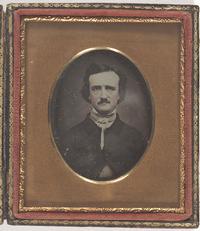This blog post is in honor of Charles Dickens' birthday. The prolific Victorian author of "epic stories" like Oliver Twist and David Copperfield, was born on Portsea Island off England's south-central coast on February 7, 1812. Dickens loved to celebrate his birthday by sharing a sumptuous dinner with his family and friends, after which he delighted in taking a long walk. The Rare Book Department at Parkway Central Library delights in celebrating Mr. Dickens' birth all year long.
There are two dedicated treasure cases on permanent, continuously renewed display, that house unique manuscripts and memorabilia of the authors Charles Dickens and Edgar Allan Poe. It is extremely fitting that these two authors share exhibition space within the Free Library because it was here in Philadelphia where the two first met. The Rare Book Department is also home to Charles Dickens' pet raven, Grip, preserved in all its glory. Grip was the inspiration for Edgar Allan Poe's immortal poem, "The Raven", and we have the only copy of Poe's hand-written manuscript in existence, which has been digitized and can be viewed in our Digital Collections. Also housed in the Rare Book Department is the Elkins Library, where a desk used by Dickens himself, along with early editions of his work, can be seen during our tours, starting daily at 11:00 a.m.
The connection between the two authors began when they met in 1842 at The United States Hotel at 4th and Chestnut Streets. Charles Dickens was on a tour of the United States giving dramatic readings from his works; these dramatic readings were Dickens’ primary source of income, despite his international popularity. Edgar Allan Poe, still struggling to make his mark, was a Dickens fan and had just finished his review of Dickens’ serialized novel, Barnaby Rudge, for Graham’s Magazine. Dickens had read Poe’s review, remarking that "the man must be a devil," because Poe had figured out the ending of the novel and commented on it before he’d actually read the final chapters.
There was a bromance brewing within the mutual respect and interest the two authors had for one another’s work, but there must have been deeper personal elements that bonded them, however briefly. Both men had endured, during different stages of their respective lives, extreme poverty that left them both with deep emotional scars that never really healed. It almost seems pre-ordained that the two should meet, albeit once and only briefly because they had so much in common. Both men had their works published in serialized form in newspapers, loved to write letters, and were deeply concerned about literary piracy.
Dickens was no stranger to literary piracy. It was the reason he had not profited as he should have from the sale of his novels, and with such a large family (a wife, nine living children and a menagerie of pets) he needed as much money as he could get—thus the need for touring like a literary rock star. Poe, on the other hand, was obsessed with literary theft and plagiarism, having encountered so much of it as a professional literary reviewer. Also, Poe felt he too was a victim of literary piracy. Whether this was fact or part of Poe's notorious paranoia is open to conjecture, but it was a subject urgently at the forefront of Poe's mind when he met with Dickens. The two hoped to lay the foundation for an international copyright law to offer legal protection to authors on both sides of the Atlantic.
From letters that Poe and Dickens exchanged, we know that Dickens, the more successful of the two, was more than kind to Poe. He had, after all, replied to Poe's letter and extended the invitation that brought about their initial meeting. Poe must have cut quite a figure in comparison: he was extremely earnest, barely making ends meet with a sickly wife at home, yet he described his time in Philadelphia as one of the happiest times in his life. It was also arguably his most prolific. During those six years that Edgar Allan Poe was a Philadelphia resident, he wrote "The Tell-Tale Heart", "The Gold Bug", and the first modern detective story, "The Murders in the Rue Morgue".
Poe had given Dickens two volumes of his short stories. When Dickens returned to England, he wrote Poe and told him that his efforts to find Poe a publisher in London had not met with success but assured Poe that he would champion his work as much as he was able. In a subsequent letter to Dickens, Poe could not hide his desperation. He practically begged Dickens to see if he could find him work as an American correspondent for some of the newspapers that used to carry Dickens serialized novels. Dickens' reply was cordial but frosty, letting Poe know he no longer had any association with the newspapers in question, and that Poe would be better off contacting the newspapers directly. There are no letters in existence indicating any further correspondence between the two.
Charles Dickens was the most popular writer of his time, while sadly, Edgar Allan Poe's enormous talent was not recognized during his lifetime. Poe was just three years older than Dickens, yet their professional and personal lives could not have been more different. How strange and wonderful that Philadelphia brought them together for one of the most legendary meetups in the history of literature.
The Free Library offers Poe and Dickens researchers many options: they can search the original manuscripts and correspondence of Edgar Allan Poe and Charles Dickens, as well as use our databases for general research. In addition, researchers can access digitized images from our Digital Collections and/or borrow books or ebooks from our catalog.
Have a question for Free Library staff? Please submit it to our Ask a Librarian page and receive a response within two business days.



